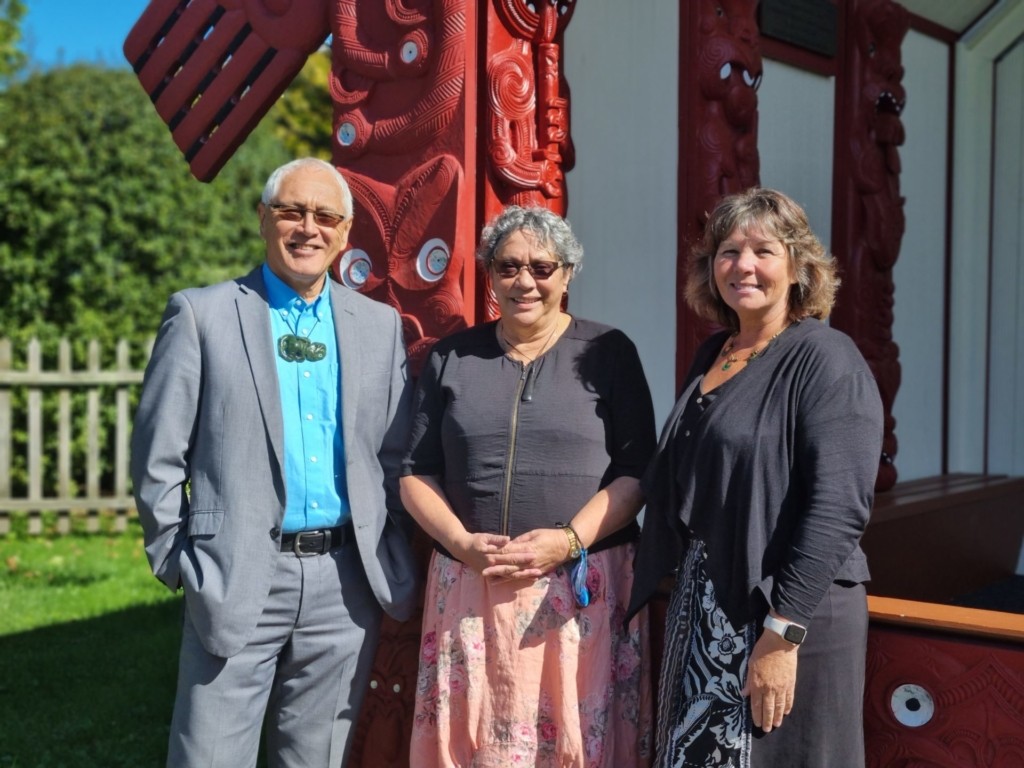
EIT’s new Rangahau Māori Professor Dr Annemarie Gillie (middle), with Māori and Indigenous Research Professor David Tipene-Leach (left) and Executive Dean Professor Nat Waran (right).
EIT’s new Professor Rangahau Māori, Dr Annemarie Gillies, has returned to the institution from where she sourced her introduction to academia many years ago at the Hawke’s Bay Community College.
Annemarie (Ngāti Kahungunu, Ngäti Awa, Te Whanau-a-Apanui and Te Arawa) is now a long established business and management academic with a previous senior appointment at Massey University and a Professorial appointment at Te Whare Wānanga o Awanuiārangi.
A pōwhiri was held last month at Te Ara o Tāwhaki, Te Ūranga Waka, EIT’s Marae in the School of Māori Studies on the Hawke’s Bay Campus in Taradale.
“I feel like I have come home because this is where I started,” Annemarie, who is originally from Waimārama, says.
Her journey into academia, and specifically Rangahau Māori (Māori research) would not have happened if it hadn’t been for the closure of the Whakatu Freezing Works.
“When I started at the Freezing Works I thought ‘I’m just going to do one season, I don’t want to be here forever,” and then every year I kept saying ‘I’ll just do this season and then I’ll finish’.
“But you start and then 10 years later you’re still there. So, for some, it was a bit harder when we were all made redundant, but for me, I felt like ‘oh, well. I was only going to do one more season anyway’.”
She soon enrolled at EIT, where many of the redundant workers went for retraining, studied business administration, and worked in accounts before completing a National Certificate in Business Studies.
Shortly after graduating with a Bachelor of Business Studies majoring in Accountancy, at Massey University, Annemarie returned to her alma mater to manage the Te Pūmanawa Hauora Māori Health Research Programme under the directorship of Sir Mason Durie.
Sir Mason, a highly-regarded psychiatrist and academic known for his contributions to Māori health, and for developing the Te whare tapa whā model, also supervised Annemarie’s PhD.
“He provided the leadership, but he didn’t let me follow him, he walked alongside me all the time,” she reflects. “He was just a nice, kind person who encouraged me to do what I wanted but guided me and kept me focused.”
Throughout her career, Annemarie says she has been “really lucky” to have had good leadership, by Sir Mason, and later on by Professor Tony Vitalis, who was Head of School of Management and then later Distinguished Professor Graham Smith at Te Whare Wānanga o Awanuiārangi.
Annemarie later went on to become the Director of Te Au Rangahau, Massey University’s Māori Business Research Centre, and was a Senior Lecturer in the School of Management until 2014.
For more than three years, she held the title of Professor Māori and Indigenous Research at Te Whare Wananga o Awanuiārangi in Whakatane, before moving to health provider Te Puna Ora o Mataatua as Research Director.
Having already dedicated a large portion of her life working at Universities, Annemarie moved to Heritage New Zealand Pouhere Taonga as Pouarahi Rārangi Kōrero in 2020, where she will continue to work in a reduced role.
“What I liked about Heritage New Zealand is that it was working with whānau, hapū and iwi and helping them to write up their own histories.”
Annemarie believes Rangahau Māori (Māori research) is relevant for “our people”.
“It’s not just doing research on Māori. It’s doing research with Māori and involving them, collaborating with them and co-designing projects.”
The new Rangahau Māori Professor is looking forward to continuing developing the space at Te Aho a Māui and at Te Pūkenga, which EIT is currently a subsidiary of.
Annemarie was initially asked to help support Māori staff, but EIT managed to convince her to play a more prominent role.
“I was really keen because that’s what I wanted most, to come in and support those Māori staff and help them in their translation of their research outputs.”
But it quickly developed into a broader remit which includes setting up the Rangahau Māori centre, supervising masters and postgraduate students, and building capacity in terms of supporting researchers where she can, in their mahi.
She is also looking forward to bringing onboard some of the projects she is currently involved with, including looking at traditional knowledge labelling, working with the New Zealand Archaeological Association and indigenous peoples around the world.
EIT’s Māori and Indigenous Research Professor David Tipene-Leach says Annemarie is a really important appointment, and EIT researchers are looking forward to working with her. “She is ‘a local’ and she is a highly experienced academic with the skills required to make our Rangahau Māori Centre a roaring success”.
EIT Executive Dean Professor Nat Waran says Annemarie’s appointment represents an exciting step in the development of Rangahau Māori.
“Annemarie’s appointment comes with a specific remit around developing and nurturing our research and researcher capability in this important Kaupapa, using her expertise for EIT but also for the wider Te Pūkenga network. She will work with our region’s mana whenua, to grow Rangahau Māori, and make sure that our research makes a difference for the people who live and work in our regions.’
